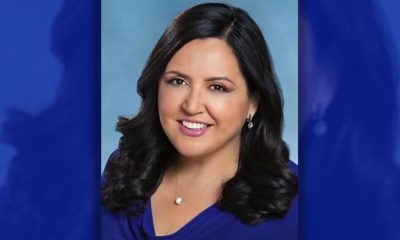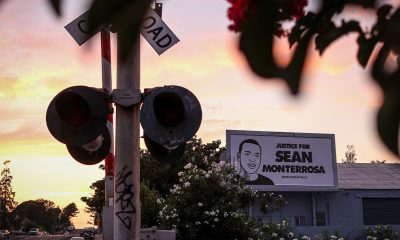Bay Area
Federal Judge Refuses to Suspend Injunction Against Encampment Sweeps
Citing a misguided legal maneuver by city attorneys, a federal magistrate judge late Monday denied a motion by the city of San Francisco to suspend a preliminary injunction that prevents the city from sweeping tent encampments in the city while there is a shortage of shelter beds.

By Joe Dworetzky
Bay City News
Citing a misguided legal maneuver by city attorneys, a federal magistrate judge late Monday denied a motion by the city of San Francisco to suspend a preliminary injunction that prevents the city from sweeping tent encampments in the city while there is a shortage of shelter beds.
In denying the request for a stay while the injunction is under appeal, U.S. Magistrate Judge Donna Ryu called out a legal gambit by city lawyers who, in their haste to appeal, disregarded her earlier advice about the proper procedure for raising their challenge to the injunction.
Ryu used the city’s legal strategy to support her conclusion that the city had little likelihood of success on its appeal of the preliminary injunction. She also found the city had not shown that it would be “irreparably injured” if the injunction remains in place.
The decision, and in particular her focus on the city’s legal maneuvering, seems likely to complicate the city’s chances of reversing the prohibition on sweeps in the near term.
The controversy is in a high-profile case brought against the city by the advocacy group Coalition on Homelessness and a number of individual plaintiffs, some of them unsheltered people living on city streets.
The plaintiffs argued that the Eighth Amendment’s prohibition against cruel and unusual punishments means that the city can’t punish a person for sleeping on city streets while there is a shortfall of available shelter beds.
Ryu agreed and on Dec. 23, 2022, she preliminarily enjoined the city from enforcing or threatening to enforce a variety of laws and ordinances that would “prohibit involuntarily homeless individuals from sitting, lying, or sleeping on public property.”
The order effectively barred the city from breaking up or sweeping tent encampments.
The judge based her ruling on the fact that the city’s shelter system was more than 4,000 beds short of being able to accommodate the full unsheltered portion of the city’s homeless population. Without shelter beds, she reasoned that the homeless had no place to sleep except the city’s streets. That meant that sweeping encampments was essentially punishing people for the involuntary status of being homeless.
When the preliminary injunction was issued, the city’s reaction was swift and sharp.
San Francisco Mayor London Breed said, “Mayors cannot run cities this way. We already have too few tools to deal with the mental illness we see on our streets. Now we are being told not to use another tool that helps bring people indoors and keeps our neighborhoods safe and clean for our residents.”
On Jan. 3, San Francisco City Attorney David Chiu issued an unusual press release that said “the Court’s order puts San Francisco in an impossible situation, practically and legally.”
The city’s outsized reaction came from its concern over the possible scope of Ryu’s order. Tent encampments are illegal in San Francisco under existing city law and can be broken up, but only if the city gives advance notice and offers the people shelter.
The city feared that the order would be read to prevent encampment sweeps until adequate shelter was available for every unsheltered person in the city. The city believed that it should only have to provide a shelter bed for the people displaced when an encampment was swept.
The difference between those interpretations was huge.
Under the city’s reading, it needed only to find a few dozen empty shelter beds on any given day so it could accommodate the people in the particular camp being swept. Under the other reading, it would have to build or acquire thousands of beds — enough for all the unsheltered — a process that would likely take years and hundreds of millions of dollars.
Apparently as a way to get that issue addressed quickly, on Jan. 3, city lawyers filed a so-called “administrative” motion to “clarify” the meaning of Ryu’s order.
Ryu was not pleased.
Despite the urgency of the city’s entreaty, at a hearing on Jan. 12, Ryu found that the city’s lawyers raised the issue improperly, trying to use a procedure for raising low-stakes administrative matters — like asking for permission to raise the page limits of a brief — to raise a clearly substantive issue.
At the hearing, Ryu admonished lawyers for the city (as well as lawyers for the plaintiffs who had followed the same procedure for one of their motions).
She told the lawyers for both sides “you know better” and warned them “not to get off on the wrong foot.”
She went on to make clear that if the city wanted to raise the issue, it should follow proper procedure for substantive motions.
The city did not take the judge up on her offer.
Instead, on Jan. 23, it filed an appeal of her preliminary injunction. A week later, on Feb. 2, it asked Ryu to stay her injunction while the appeal was pending.
In the briefing in support of the stay, city lawyers raised the same legal argument about the scope of the injunction that it had unsuccessfully tried to raise in its Jan. 3 motion to clarify.
That approach clearly bothered Ryu. In Monday’s ruling denying the stay, she emphasized that even though she had invited the city to raise the issue properly, the city had declined to do so. In her view, that approach deprived the court of an opportunity to consider the city’s argument in the context of a proper factual record.
She also found that the city had not met its burden of showing that it would suffer irreparable harm if the injunction stayed in place. For example, she pointed out that the order allows the city to require an encampment to move for the time it takes the city to clean the area. She also said the city could continue to offer those in an encampment social services and shelter options.
The finding that the city lawyers failed to follow the appropriate procedure puts the city in a difficult position.
While the city may ask the U.S. Court of Appeals for the Ninth Circuit to stay the injunction, the appeals court would not only need to take the relatively unusual step of intervening before reaching the merits of the appeal, but do so where there the city arguably didn’t take the proper steps to bring the issue before the court that issued the challenged injunction.
If the appeals court does not intervene, the sweep injunction will likely remain in place until a full trial in the case before Ryu. That trial is currently scheduled for April 3, 2024.
Jen Kwart, a spokesperson for City Attorney David Chiu, stated, “We continue to believe Judge Ryu’s order puts the City in an untenable situation, reaches beyond legal precedent, and exacerbates our homelessness crisis. We look forward to presenting our case on appeal to the Ninth Circuit.”
Hadley Rood, one of the plaintiffs’ lawyers, said “The Preliminary Injunction order is narrowly tailored and only prevents the City from brutally punishing unhoused people purely because they are homeless.”
Issues involving the city’s handling of homelessness have escalated in recent months. The city’s Board of Supervisors held a hearing on March 21 to consider a plan prepared by the city’s Department of Homelessness and Supportive Housing that was supposed to lay out how to shelter all unsheltered people in the city.
The department declined to do so, concluding that even if it had $1.45 billion and three years to implement, it couldn’t accomplish the requested result because of the difficulty in acquiring sites in the city and building adequate capacity.
The department’s stated inability to provide enough shelter combined with the city attorney’s difficulties in getting a stay seem likely to exacerbate the problems the mayor and board face leading the city in its recovery from the pandemic.
Copyright © 2023 Bay City News, Inc. All rights reserved. Republication, rebroadcast or redistribution without the express written consent of Bay City News, Inc. is prohibited. Bay City News is a 24/7 news service covering the greater Bay Area.
Alameda County
DA Pamela Price Stands by Mom Who Lost Son to Gun Violence in Oakland
Last week, The Post published a photo showing Alameda County District Attorney Pamela Price with Carol Jones, whose son, Patrick DeMarco Scott, was gunned down by an unknown assailant in 2018.

Publisher’s note: Last week, The Post published a photo showing Alameda County District Attorney Pamela Price with Carol Jones, whose son, Patrick DeMarco Scott, was gunned down by an unknown assailant in 2018. The photo was too small for readers to see where the women were and what they were doing. Here we show Price and Jones as they complete a walk in memory of Scott. For more information and to contribute, please contact Carol Jones at 510-978-5517 at morefoundation.help@gmail.com. Courtesy photo.
Bay Area
State Controller Malia Cohen Keynote Speaker at S.F. Wealth Conference
California State Controller Malia Cohen delivered the keynote speech to over 50 business women at the Black Wealth Brunch held on March 28 at the War Memorial and Performing Arts Center at 301 Van Ness Ave. in San Francisco. The Enterprising Women Networking SF Chapter of the American Business Women’s Association (ABWA) hosted the Green Room event to launch its platform designed to close the racial wealth gap in Black and Brown communities.

By Carla Thomas
California State Controller Malia Cohen delivered the keynote speech to over 50 business women at the Black Wealth Brunch held on March 28 at the War Memorial and Performing Arts Center at 301 Van Ness Ave. in San Francisco.
The Enterprising Women Networking SF Chapter of the American Business Women’s Association (ABWA) hosted the Green Room event to launch its platform designed to close the racial wealth gap in Black and Brown communities.
“Our goal is to educate Black and Brown families in the masses about financial wellness, wealth building, and how to protect and preserve wealth,” said ABWA San Francisco Chapter President LaRonda Smith.
ABWA’s mission is to bring together businesswomen of diverse occupations and provide opportunities for them to help themselves and others grow personally and professionally through leadership, education, networking support, and national recognition.
“This day is about recognizing influential women, hearing from an accomplished woman as our keynote speaker and allowing women to come together as powerful people,” said ABWA SF Chapter Vice President Velma Landers.
More than 60 attendees dined on the culinary delights of Chef Sharon Lee of The Spot catering, which included a full soul food brunch of skewered shrimp, chicken, blackened salmon, and mac and cheese.
Cohen discussed the many economic disparities women and people of color face. From pay equity to financial literacy, Cohen shared not only statistics, but was excited about a new solution in motion which entailed partnering with Californians for Financial Education.
“I want everyone to reach their full potential,” she said. “Just a few weeks ago in Sacramento, I partnered with an organization, Californians for Financial Education.
“We gathered 990 signatures and submitted it to the [California] Secretary of State to get an initiative on the ballot that guarantees personal finance courses for every public school kid in the state of California.
“Every California student deserves an equal opportunity to learn about filing taxes, interest rates, budgets, and understanding the impact of credit scores. The way we begin to do that is to teach it,” Cohen said.
By equipping students with information, Cohen hopes to close the financial wealth gap, and give everyone an opportunity to reach their full financial potential. “They have to first be equipped with the information and education is the key. Then all we need are opportunities to step into spaces and places of power.”
Cohen went on to share that in her own upbringing, she was not guided on financial principles that could jump start her finances. “Communities of color don’t have the same information and I don’t know about you, but I did not grow up listening to my parents discussing their assets, their investments, and diversifying their portfolio. This is the kind of nomenclature and language we are trying to introduce to our future generations so we can pivot from a life of poverty so we can pivot away and never return to poverty.”
Cohen urged audience members to pass the initiative on the November 2024 ballot.
“When we come together as women, uplift women, and support women, we all win. By networking and learning together, we can continue to build generational wealth,” said Landers. “Passing a powerful initiative will ensure the next generation of California students will be empowered to make more informed financial decisions, decisions that will last them a lifetime.”
Bay Area
MAYOR BREED ANNOUNCES $53 MILLION FEDERAL GRANT FOR SAN FRANCISCO’S HOMELESS PROGRAMS
San Francisco, CA – Mayor London N. Breed today announced that the U.S. Department of Housing and Urban Development (HUD) has awarded the city a $53.7 million grant to support efforts to renew and expand critical services and housing for people experiencing homelessness in San Francisco.

FOR IMMEDIATE RELEASE:
Wednesday, January 31, 2024
Contact: Mayor’s Office of Communications, mayorspressoffice@sfgov.org
***PRESS RELEASE***
MAYOR BREED ANNOUNCES $53 MILLION FEDERAL GRANT FOR SAN FRANCISCO’S HOMELESS PROGRAMS
HUD’s Continuum of Care grant will support the City’s range of critical services and programs, including permanent supportive housing, rapid re-housing, and improved access to housing for survivors of domestic violence
San Francisco, CA – Mayor London N. Breed today announced that the U.S. Department of Housing and Urban Development (HUD) has awarded the city a $53.7 million grant to support efforts to renew and expand critical services and housing for people experiencing homelessness in San Francisco.
HUD’s Continuum of Care (CoC) program is designed to support local programs with the goal of ending homelessness for individuals, families, and Transitional Age Youth.
This funding supports the city’s ongoing efforts that have helped more than 15,000 people exit homelessness since 2018 through City programs including direct housing placements and relocation assistance. During that time San Francisco has also increased housing slots by 50%. San Francisco has the most permanent supportive housing of any county in the Bay Area, and the second most slots per capita than any city in the country.
“In San Francisco, we have worked aggressively to increase housing, shelter, and services for people experiencing homelessness, and we are building on these efforts every day,” said Mayor London Breed. “Every day our encampment outreach workers are going out to bring people indoors and our City workers are connecting people to housing and shelter. This support from the federal government is critical and will allow us to serve people in need and address encampments in our neighborhoods.”
The funding towards supporting the renewal projects in San Francisco include financial support for a mix of permanent supportive housing, rapid re-housing, and transitional housing projects. In addition, the CoC award will support Coordinated Entry projects to centralize the City’s various efforts to address homelessness. This includes $2.1 million in funding for the Coordinated Entry system to improve access to housing for youth and survivors of domestic violence.
“This is a good day for San Francisco,” said Shireen McSpadden, executive director of the Department of Homelessness and Supportive Housing. “HUD’s Continuum of Care funding provides vital resources to a diversity of programs and projects that have helped people to stabilize in our community. This funding is a testament to our work and the work of our nonprofit partners.”
The 2024 Continuum of Care Renewal Awards Include:
- $42.2 million for 29 renewal PSH projects that serve chronically homeless, veterans, and youth
- $318,000 for one new PSH project, which will provide 98 affordable homes for low-income seniors in the Richmond District
- $445,00 for one Transitional Housing (TH) project serving youth
- $6.4 million dedicated to four Rapid Rehousing (RRH) projects that serve families, youth, and survivors of domestic violence
- $750,00 for two Homeless Management Information System (HMIS) projects
- $2.1 million for three Coordinated Entry projects that serve families, youth, chronically homeless, and survivors of domestic violence
In addition, the 2023 CoC Planning Grant, now increased to $1,500,000 from $1,250,000, was also approved. Planning grants are submitted non-competitively and may be used to carry out the duties of operating a CoC, such as system evaluation and planning, monitoring, project and system performance improvement, providing trainings, partner collaborations, and conducting the PIT Count.
“We are very appreciative of HUD’s support in fulfilling our funding request for these critically important projects for San Francisco that help so many people trying to exit homelessness,” said Del Seymour, co-chair of the Local Homeless Coordinating Board. “This funding will make a real difference to people seeking services and support in their journey out of homelessness.”
In comparison to last year’s competition, this represents a $770,000 increase in funding, due to a new PSH project that was funded, an increase in some unit type Fair Market Rents (FMRs) and the larger CoC Planning Grant. In a year where more projects had to compete nationally against other communities, this represents a significant increase.
Nationally, HUD awarded nearly $3.16 billion for over 7,000 local homeless housing and service programs including new projects and renewals across the United States.
-

 Activism4 weeks ago
Activism4 weeks agoOakland Post: Week of March 27 – April 2, 2024
-

 #NNPA BlackPress4 weeks ago
#NNPA BlackPress4 weeks agoCOMMENTARY: D.C. Crime Bill Fails to Address Root Causes of Violence and Incarceration
-

 #NNPA BlackPress4 weeks ago
#NNPA BlackPress4 weeks agoMayor, City Council President React to May 31 Closing of Birmingham-Southern College
-

 #NNPA BlackPress4 weeks ago
#NNPA BlackPress4 weeks agoBeloved Actor and Activist Louis Cameron Gossett Jr. Dies at 87
-

 Community1 week ago
Community1 week agoFinancial Assistance Bill for Descendants of Enslaved Persons to Help Them Purchase, Own, or Maintain a Home
-

 Activism3 weeks ago
Activism3 weeks agoOakland Post: Week of April 3 – 6, 2024
-

 Business1 week ago
Business1 week agoV.P. Kamala Harris: Americans With Criminal Records Will Soon Be Eligible for SBA Loans
-

 Activism2 weeks ago
Activism2 weeks agoOakland Post: Week of April 10 – 16, 2024
























































